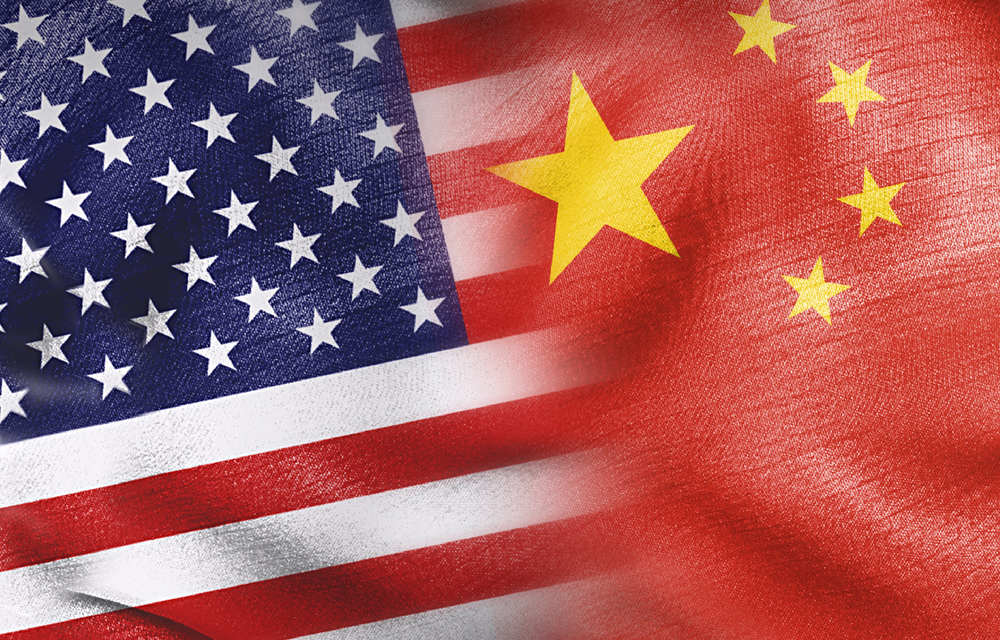SinoTech: Trump Blocks Broadcom-Qualcomm Deal, Expected to Announce Tech-Related Tariffs and Penalties Against China
President Trump issued an executive order last Wednesday blocking Singaporean chipmaker Broadcom’s bid to acquire American competitor Qualcomm after the Committee on Foreign Investment in the United States (CFIUS)
Published by The Lawfare Institute
in Cooperation With

President Trump issued an executive order last Wednesday blocking Singaporean chipmaker Broadcom’s bid to acquire American competitor Qualcomm after the Committee on Foreign Investment in the United States (CFIUS) warned that the deal might give Chinese tech firms an upper hand in the race to 5G. Broadcom officially withdrew its offer two days later. The order reflects Washington’s increasingly firm approach toward Chinese high-tech investment and practices related to forced transfer of technology and theft of intellectual property. Driven in significant part by such concerns, Trump is widely expected to propose new tariffs and penalties against China by the end of the week.
Broadcom’s bid, announced last November, had been on the rocks since March 4, when CFIUS ordered Qualcomm to delay a key shareholder meeting while it conducted a rare preemptive review. CFIUS’s concerns, explained in a March 5 letter to the parties, centered on whether the proposed acquisition would surrender U.S. technological leadership to Chinese firms. Qualcomm is the major American contender in the race to deploy 5G wireless technology worldwide over the next few years. Its leading international competitor is Huawei, which has already signed 5G field trial agreements with 45 telecom operators across the world. In its March 5 letter, CFIUS cited concerns that acquisition by Broadcom, which invests relatively little in research and development and has collaborated with Huawei, would weaken Qualcomm’s international competitiveness. This, CFIUS warned, “would leave an opening for China to expand its influence on the 5G standard-setting process,” and therefore "would have substantial negative national security consequences for the United States."
Trump’s executive order has prompted suggestions in both the American and Chinese press that the nascent trade war could discourage future Chinese investment in American tech companies or threaten collaboration between U.S. and Chinese tech companies more generally. Those fears may soon be realized if, as noted above, Trump announces new penalties against Chinese tech firms in the next few days. The measures have been in development since last August, when the president prompted the U.S. Trade Representative to launch an investigation of China’s intellectual property and technology transfer practices under Section 301 of the Trade Act of 1974. U.S. Trade Representative Robert Lighthizer reportedly suggested levying $30 billion in tariffs against selected Chinese firms in a meeting two weeks ago with President Trump, and Reuters reported last week that Trump wants to bump that up to $60 billion. The tariffs will likely be paired with new restrictions on U.S. investment by Chinese firms and mandatory review for transfers of sensitive technologies to foreign corporations. The details of these tariffs and restrictions were not immediately clear, and may be kept intentionally fuzzy even after a White House announcement to give U.S. industry an opportunity to weigh in.
The frustration of Broadcom’s attempt to acquire Qualcomm suggests that the administration’s measures against Chinese companies may spill over to other players in the international tech industry. CFIUS’s March 5 letter focused on Broadcom’s myopic investment strategies, making only brief reference to classified concerns about the company’s “relationship with third party foreign entities.” But a Bloomberg article published in late February reported that CFIUS was also motivated by concerns about Broadcom’s relationships to Huawei and other Chinese tech companies, highlighting the Singaporean firm’s uneasy position between commercial relations in China and governmental relations in the U.S. 54 percent of Broadcom’s 2017 revenue came from operations in China, but, as the company pointed out in a March 9 letter to Congress, all but one member of its Board of Directors and 90 percent of its shareholders are American. And at a White House press conference last November, CEO Hock Tan and President Trump jointly announced that Broadcom, which the President lauded as “one of the really great, great companies,” would redomicile in the United States. Although relations no longer appear so chummy, Broadcom has maintained its intention to shift its headquarters to the U.S., and on March 12 announced plans to expedite the move in a last-ditch attempt to avoid CFIUS’s jurisdiction.
Qualcomm, though incorporated in the U.S., must navigate many of the same ambiguities as its Singaporean competitor. In fact, Qualcomm derives a higher proportion of its revenue from the Chinese market than Broadcom, and has collaborated extensively with Chinese tech companies on past projects, including several significant partnerships with Huawei. In a particular irony, several of Qualcomm’s Chinese partners advocated against Broadcom’s attempted takeover in January, more than a month before CFIUS began its formal review. And Qualcomm has strong reasons to stay on China’s good side; its $44 billion takeover of Dutch chipmaker NXP is currently awaiting antitrust approval from China’s Ministry of Commerce, having already received permission from 8 of the 9 necessary regulatory bodies. On March 8, Broadcom employed these connections to fire back in an infosheet that accused Qualcomm of “partnering with Chinese companies and promoting advancements in technology in China for years.”
Scrutiny of Chinese high-tech commercial ties has been building for months. Last September President Trump blocked the acquisition of U.S. chipmaker Lattice Semiconductor by a China-backed private-equity firm, and CFIUS skepticism doomed Chinese acquisition of semiconductor testing firm Xcerra last month. Congress has also gotten in on the action; a February 28 letter from Senator John Cornyn (R-TX) presaged CFIUS’s examination of the Broadcom-Qualcomm deal; pressure from Congress reportedly motivated the recent cancellation of proposed collaborations between Huawei and American telecoms; and a bill brought before the Senate in February would prohibit federal agencies from procuring equipment from Huawei, ZTE, and other Chinese companies. More significantly, the House and Senate are currently considering a bill that would allow CFIUS to examine technology transfer agreements to foreign firms and acquisitions of important developing technology by “countries of special concern.” The bill, under pressure from U.S. tech companies, is reportedly being revised to relax restrictions on technology transfers, and may overlap with the restrictions Trump is expected to announce later this week.
China Holds Annual Two Meetings; Innovation Among the 9 Key Tasks for 2018
The Chinese government’s “Two Meetings,” the annual meeting of representatives from the National People’s Congress (NPC) and the National Committee of the Chinese People’s Political Consultative Conference (CPPCC), drew to a close yesterday after two weeks of activity. Media coverage of the Two Sessions focused on the removal of presidential and vice-presidential term limits from China’s Constitution and the re-election of Xi Jinping as president, with right-hand man Wang Qishan assuming the role of vice-president. Although technology policy did not take center stage, Premier Li Keqiang responded yesterday to the threat of new U.S. tariffs on Chinese products, discussed above, with a pledge to open up China’s restrictive foreign investment regime, specifically promising to eliminate mandatory requirements for technology transfer in the general technology sector and to better safeguard intellectual property rights. These issues have been key concerns of foreign investors, and are subjects of the United States Trade Representative’s ongoing investigation of China under Section 301 of the Trade Act of 1974.
China’s latest promises to create a level playing field for foreign enterprises dovetail with new moves to implement stricter protection for intellectual property rights. As part of a major government reorganization plan, China’s State Intellectual Property Office will be restructured to consolidate overlapping regulatory authorities and reinforce IP protection. The government also pledged to expand foreign investment access to sectors including financial services, telecommunications, and medical services. In a work report released on March 11, the government declared that it would craft a foreign investment law to “promote and protect” foreign investments by “creat[ing] a transparent, stable and predictable business environment for foreign investors and protect their rights and interests, ensuring that they enjoy national treatment and a fair market.” In turn, China called upon other countries to grant fair treatment to the overseas investment of Chinese companies.
More generally, the Two Sessions confirmed that technological innovation will continue to play a leading role in China’s economic development. “Accelerating construction of an innovative nation” was the second of nine Key Enumerated Tasks announced by Premier Li Keqiang in China’s 2018 Government Work Report, an important but non-specific document that can be roughly analogized to the American State of the Union address. Premier Li pledged that the central government would “make China a country of innovators” by implementing an “innovation-driven development strategy” and strengthening the competitiveness of the Chinese economy. “Innovation is the primary driving force of China,” President Xi added at a smaller session of Guangdong delegates on March 7. Other speeches at the Two Sessions contained proposals for how the Chinese government would achieve the ambitions described in the Work Report—including Li’s pledge to place greater emphasis on basic research—though the policy details of these ambitions remain unclear.
The Chinese government continued to emphasize its aim of fostering an environment in which the digital economy can flourish. These efforts include plans to gradually eliminate roaming fees for domestic cell data usage, speed up broadband while lowering costs, and “make free internet access available in more public places.” China already possesses one of the world’s most digitized economies, with mobile apps quickly replacing physical cash. China has also begun research in 6G, Minister of Industry and Information Technology Miao Wei announced in an interview on March 9. The developing 6G technology would, according to Miao, allow “[linking] machines with machines as well as machines and humans,” a key step in the development of the Internet of Things.
The government also announced its plans to attract more talent from home and abroad to its technology sector. A number of officials, including Zhao Zeliang, Director of Cybersecurity Coordination for the Cyberspace Administration of China, expressed particular concern over China’s dearth of talent in cybersecurity. As China’s digital economy rapidly expands, vulnerability to cybersecurity threats has become a major problem.
In Other News
Some Beijing police officers wore smart glasses equipped with facial recognition technology during the meeting of the Two Sessions. Chinese law enforcement agencies have invested in facial recognition technology, both in order to conduct constant surveillance of politically suspect individuals and for more minor offenses, but equipping individual police officers with the technology is still relatively rare.
Cybersecurity outfit FireEye linked a suspected Chinese hacking outfit to a series of recent intrusions against U.S., European, and Hong Kong entities connected to the South China Sea. The group has previously conducted attacks against South-China-Sea targets, but appears to be focused on maritime targets more generally.
The state-owned China Aerospace Science and Industry Corporation announced (the announcement is available in English and Chinese) that it would establish a subsidiary entity to launch satellites that could provide internet access to member countries of China’s Belt and Road Initiative. Technological infrastructure has been an often overlooked aspect of the Belt and Road; last month a fiber-optic cable from China to Nepal went live, and the Nigerian government announced a $550 million deal to purchase two communications satellites from a separate subsidiary of China Aerospace.
The China Securities Regulatory Commission granted accelerated approval for the Chinese IPO of Taiwanese electronics manufacturer Foxconn. The move has been interpreted as an encouragement for additional companies, particularly domestic tech companies, to relist on the mainland. Reports earlier this month indicated that Chinese regulators might allow these companies to list on Chinese markets through depositary receipts.
At a March 9 Two Sessions press conference, People’s Bank of China Governor Zhou Xiaochuan stated that China might accept digital currencies that did not threaten economic order, but warned that such currencies must be carefully scrutinized. Earlier this year, in the latest of a series of crackdowns, the Chinese government blocked access to foreign websites offering cryptocurrency trading and initial coin offerings. Last year the People’s Bank of China began researching the possibility of issuing its own digital currency.
Chinese security researchers were noticeably absent from an international hacking competition held in Canada last week after the Chinese government prohibited researchers from attending such conferences. The prohibition has been interpreted as a move to keep valuable knowledge of software vulnerabilities within China.
Analysis and Commentary
Elsewhere on Lawfare, this week’s Cyberlaw Podcast discusses President Trump’s decision to block Broadcom’s bid (CFIUS segment begins at 20:20). Stewart Baker also kicked off last week’s Cyberlaw Podcast with a discussion of the Broadcom-Qualcomm snafu, which shifted to a broader discussion of tech struggles between China and the U.S. For more audio analysis of the Broadcom-Qualcomm deal, check out Friday’s edition of the National Security Law Podcast (relevant discussion begins at 37:00) and last week’s China 21 podcast.
Moving to other policy discussions, Jeffrey Ding of Oxford’s Future of Humanity Institute gives an in-depth look at China’s ambitions in AI. PEN America has published an examination of increasing online censorship during President Xi’s tenure. At the Center for Strategic and International Studies, Samm Sacks analyzes the interaction between China’s data privacy regime and the European Union’s General Data Protection Regulation. Elsa Kania offers a briefer examination of Chinese military strategy in cyberspace for the Australian Strategic Policy Institute.
In the popular press, Ed Hammond and Ian King of Bloomberg give a fascinating look into the disintegration of the Broadcom-Qualcomm deal, and James Fontanella-Khan, Eric Platt and Shawn Donnan offer a similarly detailed post-mortem in the Financial Times. The Financial Times, The Economist, and the New York Times discuss how the deal’s cancellation may affect Sino-American tech trade more broadly, and Liz Alderman reports in the New York Times that skepticism towards Chinese takeovers is spreading to Europe and elsewhere. In the Wall Street Journal, Li Yuan provides context on the close links between Chinese tech companies and the CCP, while Cade Metz investigates the U.S. government’s attempts to establish closer links to American AI developers in the New York Times. Congressman Robert Pittinger argues for strengthening CFIUS protections in a Wall Street Journal op-ed. Finally, the past two weeks have witnessed a continued proliferation of articles on the general U.S.-China struggle for technological dominance, with features in The Economist, The Times of London, and the Australian Financial Review.






